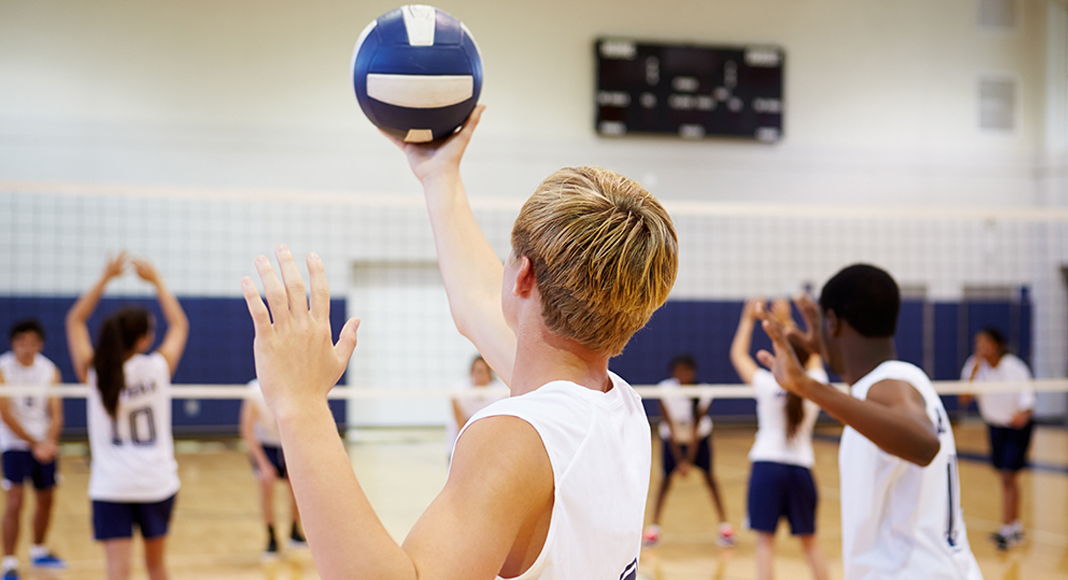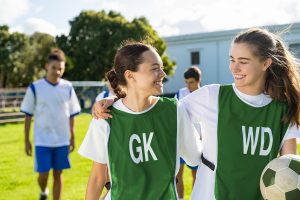 Traditionally when people talk about concussions and sports, they immediately think of football. But other sports such as cheerleading, boys, and girls’ soccer, and hockey also pose a moderate risk.
Traditionally when people talk about concussions and sports, they immediately think of football. But other sports such as cheerleading, boys, and girls’ soccer, and hockey also pose a moderate risk.
Kids can also get a concussion just from crashing their bikes or getting hit in the head during gym class. Whether your kids bonk their heads at home, school, or in sports, concussion management is virtually the same.
The Three-Concussion Myth
Many people have heard that if you’ve had three or more concussions you can’t play sports anymore. There is no set number of concussions that disqualify someone from participating in sports. There is no “three-strike” rule.
If you have had a concussion, you’re slightly more likely to get another. But symptoms are how we base treatment. When it comes to a discussion on possibly retiring from contact sports, there are two things to consider:
- How long is it taking to recover? If every concussion is taking 1-3 months to come back from, that’s a significant quality of life inhibitor and lots of extra worries and stress trying to get proper school accommodations, etc.
- Is there less force required to sustain a concussion? Are we getting concussions from what seem to be fairly innocuous head impacts like opening a cupboard or a routine header in soccer?
Signs and Symptoms
The majority of concussion symptoms usually appear within the first hour but can show up anytime in the first 72 hours.
- Headache
- Nausea
- Dizziness
- Vomiting
- Confusion
- Glazed look in eyes
- Vision changes
- Difficulty concentrating
- Balance issues
- “Not feeling right”
Concussion Recovery
Concussion treatment has grown and evolved in the last 10 years. It’s all about finding a balance between avoiding overexertion while also continuing to keep up with academics and daily life as much as possible. Here are some tips while your kid is recovering:
- Be sure to avoid any head impacts during the recovery period.
- Balance school and sports activities – social isolation has been shown to worsen concussion outcomes. Kids should be in school as much as they can tolerate and can sit on the side during practice to be around teammates should they feel up to it. Sometimes symptoms are bad enough this is not advised but can take place later in the recovery period.
- Walking and mild cardiovascular exercise help concussion recovery.
- Reduce screen time as much as possible while still letting them communicate with friends and keep up with schoolwork.
- Physical therapy with a therapist trained in concussion recovery has been shown to speed up recovery by about four days on average. They will provide a supervised sub-symptom exercise program and will provide vestibular therapy and massage to help manage any dizziness and headaches.
- Every high school in Iowa, by law, has a return-to-learn plan from concussion. Use your child’s guidance counselor and school nurse as resources.
Prevention
Reducing unnecessary head impacts, as well as, education and awareness are the best ways to prevent concussions. Parents, students, teachers, and coaches should all be aware of the signs of a concussion. When those signs begin manifesting, it’s critical to pull students out of play.
It’s not enough to say helmets will prevent concussions when it comes to sports. Helmets, specifically football helmets, are made to prevent skull fractures, not concussions. However, helmets for cycling and skateboarding-like activities are shown to significantly reduce the risk of head injury. So, playing smart, reducing unnecessary head impacts in practice, and practicing proper techniques, like tackling in football and heading in soccer, are crucial in preventing concussions.
If your child is experiencing any concussion symptoms, it’s important to see a provider. Find a location near you.
 About the author: Dr. Eric Reynolds specializes in musculoskeletal injuries and concussion care. He has a unique background that blends pediatrics and sports medicine. Dr. Reynolds is located at MercyOne Clive Sports Medicine and MercyOne Des Moines Pediatrics Urgent Care.
About the author: Dr. Eric Reynolds specializes in musculoskeletal injuries and concussion care. He has a unique background that blends pediatrics and sports medicine. Dr. Reynolds is located at MercyOne Clive Sports Medicine and MercyOne Des Moines Pediatrics Urgent Care.
Connect with MercyOne Des Moines Medical Center
 Website: MercyOne.org/desmoines
Website: MercyOne.org/desmoines
Twitter: @MercyOneDSM
Facebook: @mercyonedesmoines
Instagram: @mercyone_iowa
This article is part of a series of sponsored articles by MercyOne Des Moines Medical Center
Your First Mammogram, Explained
GE Reflux: A medical diagnosis that’s literally hard to swallow
Understanding Necrotizing Enterocolitis
Facts About COVID-19 Vaccination For Children 12+
How Genetics Impact Your Pregnancy
COVID-19 and Mammograms: What you need to know
Period Pain? It Might Be Endometriosis
Is it Perimenopause or Am I Going Crazy?!
















